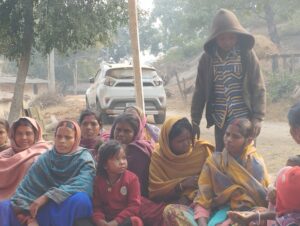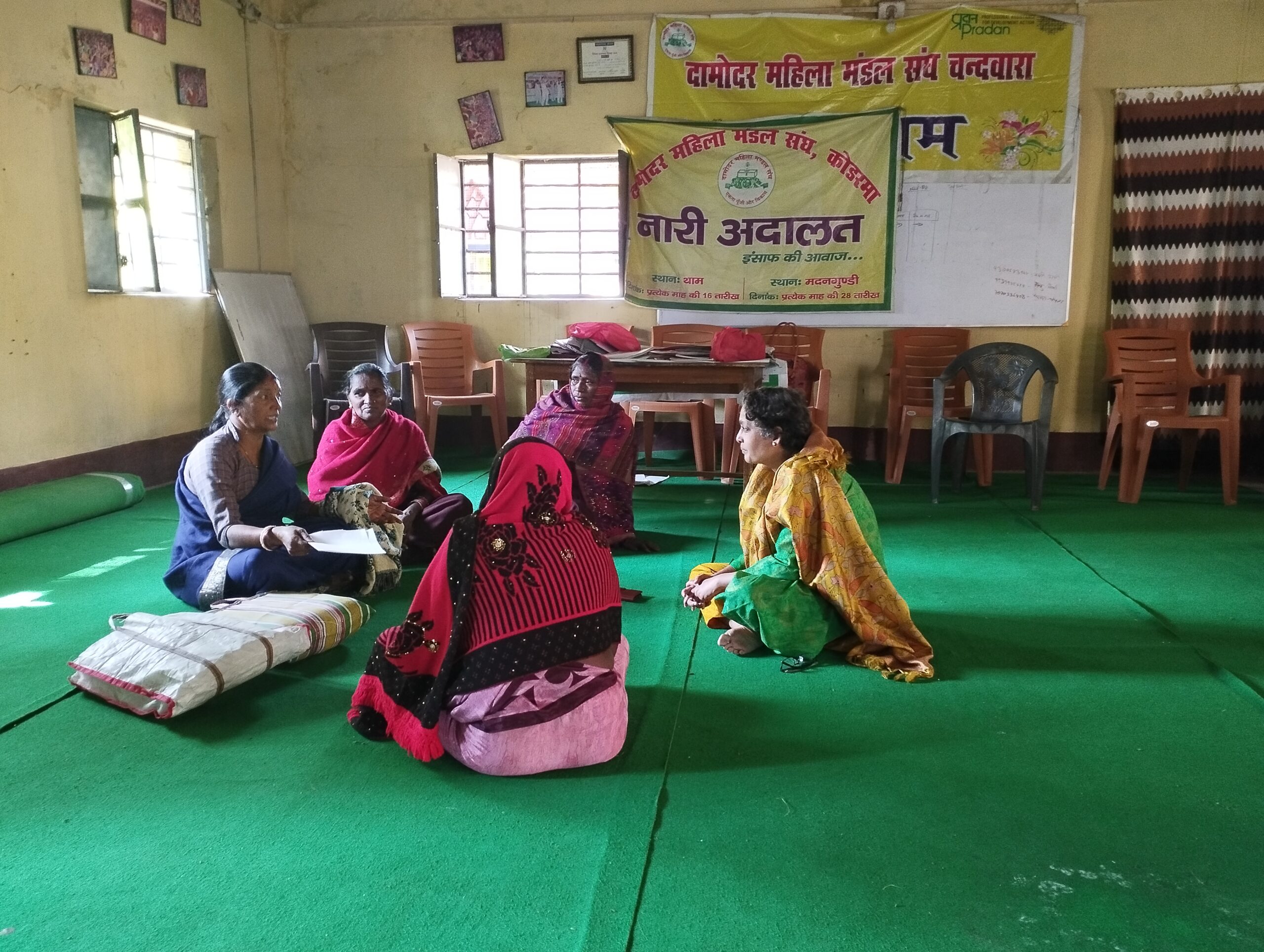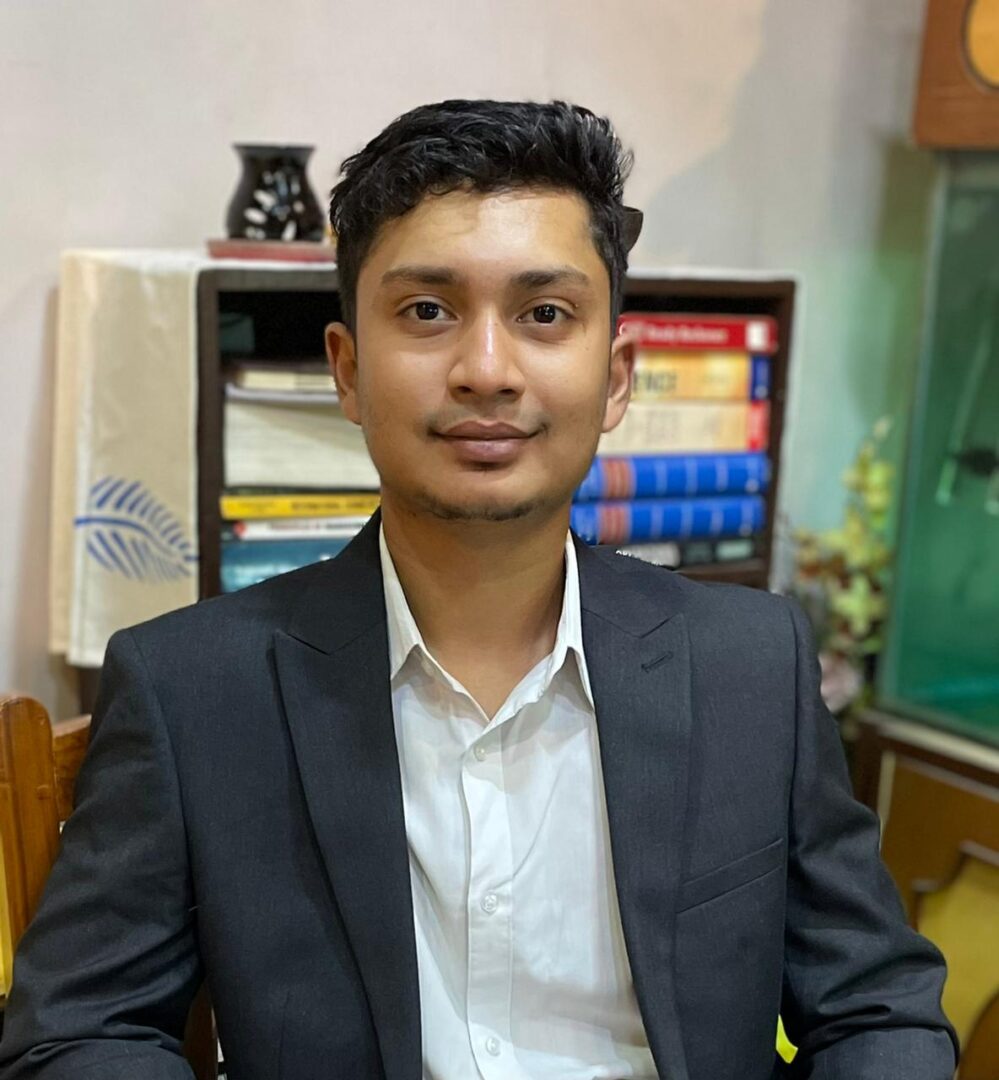The Nari Adalat of Damodar Valley Mahila Mandal (DVMM), one of the oldest in Jharkhand, came up out of the need for women who wanted a platform to voice their grievances in a forum that gave a safe platform for them, devoid of the social inequities that continue to reflect in our panchayats and other fora.
I recently visited Padma block and Chandwara block of Hazaribagh district in Jharkhand observing Nari Adalats in action. It was a matter of great satisfaction for me to see them thriving after 20 years. I had seen their initiation as a part of my work in MHRD way back in 2000. They were thriving today not because of any external support but because of their value, their
credibility, and the accessibility of their process.
Mohini Devi, one of the trained Mediators shared that many of the men who came back from migration started abandoning their wives. They wanted “modern women” whom they had seen in the cities. Mina Devi, a model traditional bahu, shared the struggles within her own family. The Adalat had to stage satyagraha to help support their first case. They held rallies, made representations, and worked hard to build bridges within their social and relational structures to sustain the Adalat. She also highlighted the value of observation and training of Mediation by Mahila Samkhya in Gujarat which helped build their capability and greater credibility.
 The greatest support was accorded to the Self-Help group catalysed and facilitated by PRADAN, a well-known NGO. All of the Community Mediators in fact said without PRADAN. They even had a song for Pradan as their Vardaan (boon). Today, they are proud to have mediated over 300 cases with close to 80% settlement rate.
What I found very heartening was the upholding of key principles of neutrality which despite its women-centricity has been accepted by all members of the community and has been the bedrock of their credibility. The other critical process is the follow up undertaken (for months if need be) to ensure that agreements are adhered with social and communal support along with support for legal/court process if need be and so sought by the aggrieved.
In my current work in community mediation in Jharkhand, the concept of Nari Adalat has been extremely useful in designing not just the training content, but also in taking case studies and finding parallels in the community mediation context. Although these two are very separate in their approach, working, and end results, both these movements are essentially working towards the SDG16 goal of providing access to justice to all.
The 2030 Sustainable Goal Agenda upholds its vision of the centrality of access to justice and its cross-cutting relevance across all other SDGs. Models like the Nari Adalat, the work of Libra in Jodhpur and the work of India Labour Line, all provide wonder models for making SDG 16, and more importantly, Article 39A of the Constitution, a reality.
The greatest support was accorded to the Self-Help group catalysed and facilitated by PRADAN, a well-known NGO. All of the Community Mediators in fact said without PRADAN. They even had a song for Pradan as their Vardaan (boon). Today, they are proud to have mediated over 300 cases with close to 80% settlement rate.
What I found very heartening was the upholding of key principles of neutrality which despite its women-centricity has been accepted by all members of the community and has been the bedrock of their credibility. The other critical process is the follow up undertaken (for months if need be) to ensure that agreements are adhered with social and communal support along with support for legal/court process if need be and so sought by the aggrieved.
In my current work in community mediation in Jharkhand, the concept of Nari Adalat has been extremely useful in designing not just the training content, but also in taking case studies and finding parallels in the community mediation context. Although these two are very separate in their approach, working, and end results, both these movements are essentially working towards the SDG16 goal of providing access to justice to all.
The 2030 Sustainable Goal Agenda upholds its vision of the centrality of access to justice and its cross-cutting relevance across all other SDGs. Models like the Nari Adalat, the work of Libra in Jodhpur and the work of India Labour Line, all provide wonder models for making SDG 16, and more importantly, Article 39A of the Constitution, a reality.
 The greatest support was accorded to the Self-Help group catalysed and facilitated by PRADAN, a well-known NGO. All of the Community Mediators in fact said without PRADAN. They even had a song for Pradan as their Vardaan (boon). Today, they are proud to have mediated over 300 cases with close to 80% settlement rate.
What I found very heartening was the upholding of key principles of neutrality which despite its women-centricity has been accepted by all members of the community and has been the bedrock of their credibility. The other critical process is the follow up undertaken (for months if need be) to ensure that agreements are adhered with social and communal support along with support for legal/court process if need be and so sought by the aggrieved.
In my current work in community mediation in Jharkhand, the concept of Nari Adalat has been extremely useful in designing not just the training content, but also in taking case studies and finding parallels in the community mediation context. Although these two are very separate in their approach, working, and end results, both these movements are essentially working towards the SDG16 goal of providing access to justice to all.
The 2030 Sustainable Goal Agenda upholds its vision of the centrality of access to justice and its cross-cutting relevance across all other SDGs. Models like the Nari Adalat, the work of Libra in Jodhpur and the work of India Labour Line, all provide wonder models for making SDG 16, and more importantly, Article 39A of the Constitution, a reality.
The greatest support was accorded to the Self-Help group catalysed and facilitated by PRADAN, a well-known NGO. All of the Community Mediators in fact said without PRADAN. They even had a song for Pradan as their Vardaan (boon). Today, they are proud to have mediated over 300 cases with close to 80% settlement rate.
What I found very heartening was the upholding of key principles of neutrality which despite its women-centricity has been accepted by all members of the community and has been the bedrock of their credibility. The other critical process is the follow up undertaken (for months if need be) to ensure that agreements are adhered with social and communal support along with support for legal/court process if need be and so sought by the aggrieved.
In my current work in community mediation in Jharkhand, the concept of Nari Adalat has been extremely useful in designing not just the training content, but also in taking case studies and finding parallels in the community mediation context. Although these two are very separate in their approach, working, and end results, both these movements are essentially working towards the SDG16 goal of providing access to justice to all.
The 2030 Sustainable Goal Agenda upholds its vision of the centrality of access to justice and its cross-cutting relevance across all other SDGs. Models like the Nari Adalat, the work of Libra in Jodhpur and the work of India Labour Line, all provide wonder models for making SDG 16, and more importantly, Article 39A of the Constitution, a reality. 


